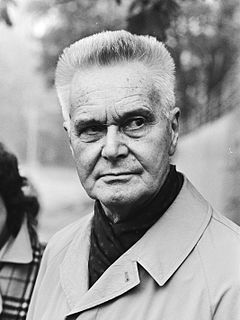Related Research Articles

Jan Tinbergen was an important Dutch economist. He was awarded the first Nobel Memorial Prize in Economic Sciences in 1969, which he shared with Ragnar Frisch for having developed and applied dynamic models for the analysis of economic processes. He is widely considered to be one of the most influential economists of the 20th century and one of the founding fathers of econometrics. It has been argued that the development of the first macroeconometric models, the solution of the identification problem, and the understanding of dynamic models are his three most important legacies to econometrics. Tinbergen was a founding trustee of Economists for Peace and Security. In 1945, he founded the Bureau for Economic Policy Analysis (CPB) and was the agency's first director.

Tjalling Charles Koopmans was a Dutch American mathematician and economist. He was the joint winner with Leonid Kantorovich of the 1975 Nobel Memorial Prize in Economic Sciences for his work on the theory of the optimum allocation of resources. Koopmans showed that on the basis of certain efficiency criteria, it is possible to make important deductions concerning optimum price systems.
Erasmus University Rotterdam is a public university located in Rotterdam, Netherlands. The university is named after Desiderius Erasmus Roterodamus, a 15th-century humanist and theologian.
Henri (Hans) Theil was a Dutch econometrician, Professor at the Netherlands School of Economics in Rotterdam, known for his contributions to the field of econometrics.
Pieter (Piet) Rietveld was a Dutch economist and Professor in Transport Economics at the Vrije Universiteit, Amsterdam, and a fellow at the Tinbergen Institute. He was among the top researchers in economic geography according to IDEAS/RePEc.
The Tinbergen Institute is a joint institute for research and education in economics, econometrics and finance of the University of Amsterdam, the VU University Amsterdam and the Erasmus University Rotterdam. The institute was founded in 1987 and is named after the Dutch economist Jan Tinbergen, a Nobel prize-winning professor at the Erasmus University Rotterdam.

Berend "Bert" de Vries is a retired Dutch politician of the Christian Democratic Appeal (CDA) party and economist.
Jan Brinkhuis is a Dutch mathematician, and Associate Professor of Finance and Mathematical Methods and Techniques at the Econometric Institute of Erasmus University Rotterdam, specialized in the theory and application of optimization theory and game theory.
Jan Sandee was a Dutch economist, consultant and Professor of Econometrics at the Netherlands School of Economics, Rotterdam, who headed the Econometric Institute from 1966 to 1971.
Willem Hendrik Somermeyer was a Dutch economist, Professor in Econometrics at the Erasmus University Rotterdam, and member of the Royal Netherlands Academy of Arts and Sciences, particularly known for his consumption-savings model.
Teunis (Teun) Kloek is a Dutch economist and Emeritus Professor of Econometrics at the Erasmus Universiteit Rotterdam. His research interests centered on econometric methods and their applications, especially nonparametric and robust methods in econometrics.
Herman Koene van Dijk is a Dutch economist Professor Emeritus at the Econometric Institute of the Erasmus University Rotterdam, known for his contributions in the field of Bayesian analysis.
Harm Bart is a Dutch mathematician, economist, and Professor of Mathematics at the Erasmus University Rotterdam, particularly known for his work on "factorization problems for matrix and operator functions."
Philippus Henricus Benedictus Franciscus "Philip Hans" Franses is a Dutch economist and Professor of Applied Econometrics and Marketing Research at the Erasmus University Rotterdam, and dean of the Erasmus School of Economics, especially known for his 1998 work on "Nonlinear Time Series Models in Empirical Finance."

Jan Salomon (Mars) Cramer was a Dutch economist, Professor of Statistics and Econometrics at the University of Amsterdam, known for his work of empirical econometrics.
Albert Peter Marie (Albert) Wagelmans is a Dutch economist and Professor of Management Science at the Erasmus School of Economics (ESE) of the Erasmus University Rotterdam working in the fields of mathematical optimization methods for production, public transport and health care planning.
Christiaan Heij is a Dutch mathematician, Assistant Professor in statistics and econometrics at the Econometric Institute at the Erasmus University Rotterdam, known for his work in the field of mathematical systems theory, and econometrics.
The Netherlands Economic Institute (NEI) is a research institute based in Rotterdam.
Anirudh Lal Nagar was an Indian econometrician notable for his work on the finite-sample inference in econometrics.
Anton Peter Barten was a Dutch economist.
References
- ↑ The institute is ranked among the top 6% Economic Institutions. See Top 10% Economic Institutions, as of August 2013. Accessed Sept 9, 2013.
- ↑ Francis X. Diebold, Glenn D. Rudebusch (2013) Yield Curve Modeling and Forecasting. p. ii
- 1 2 Pedro Garcia Duarte (2007) Constructing Concepts of Optimal Monetary Policy in the Postwar Period. p. 35
- 1 2 Philip Hans Franses (2005) Annual Report 2004: Econometric Institute p. 7
- ↑ Christiaan Heij et al. (2004) Econometric Methods with Applications in Business and Economics. Oxford University Press. p. v.
- ↑ Baldev Raj, J. Koerts (1992) Henri Theil's Contributions to Economics and Econometrics: Econometric theory and methodology. Vol. I. Springer, 1992
- ↑ Franses (2005; Preface)